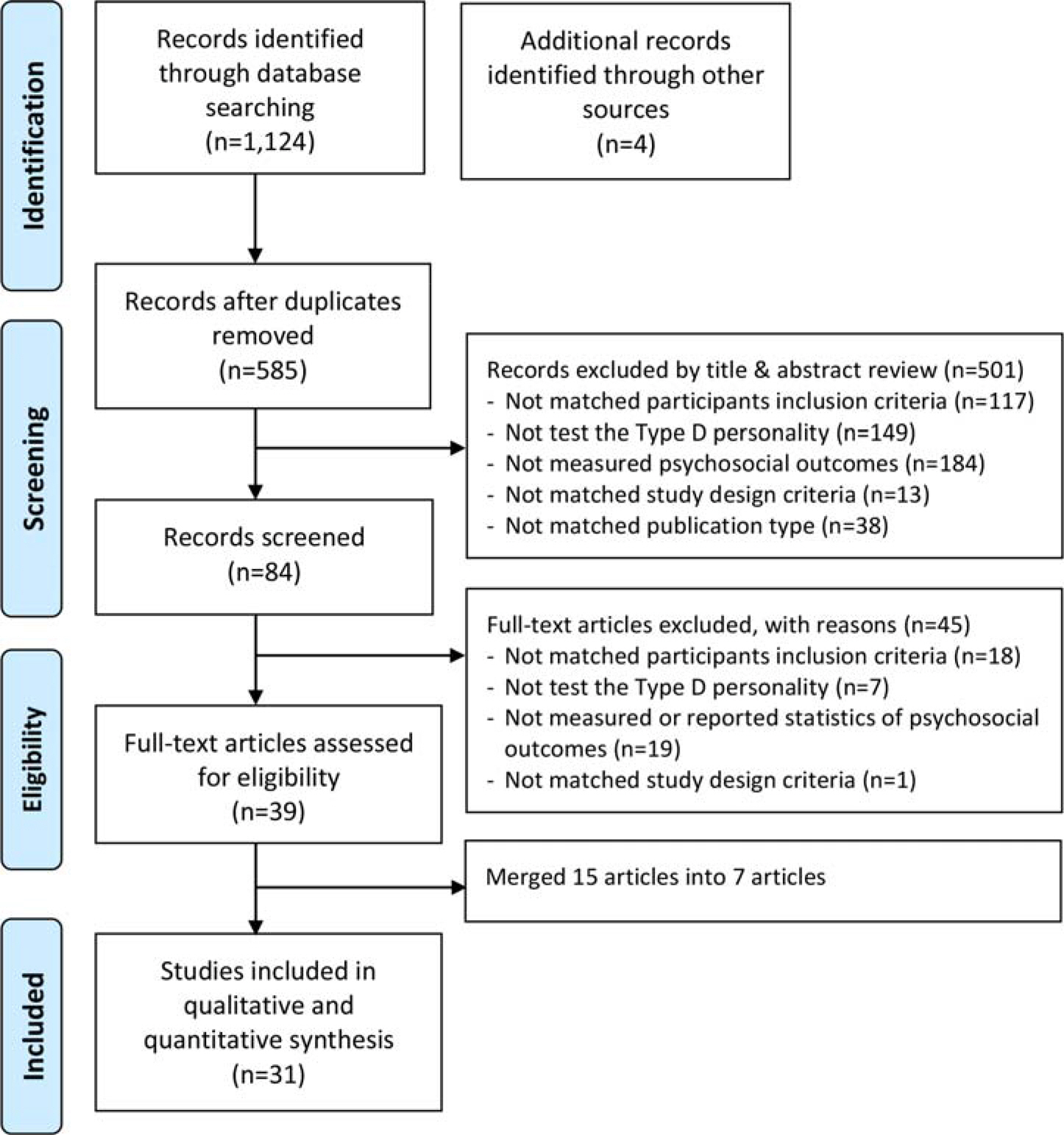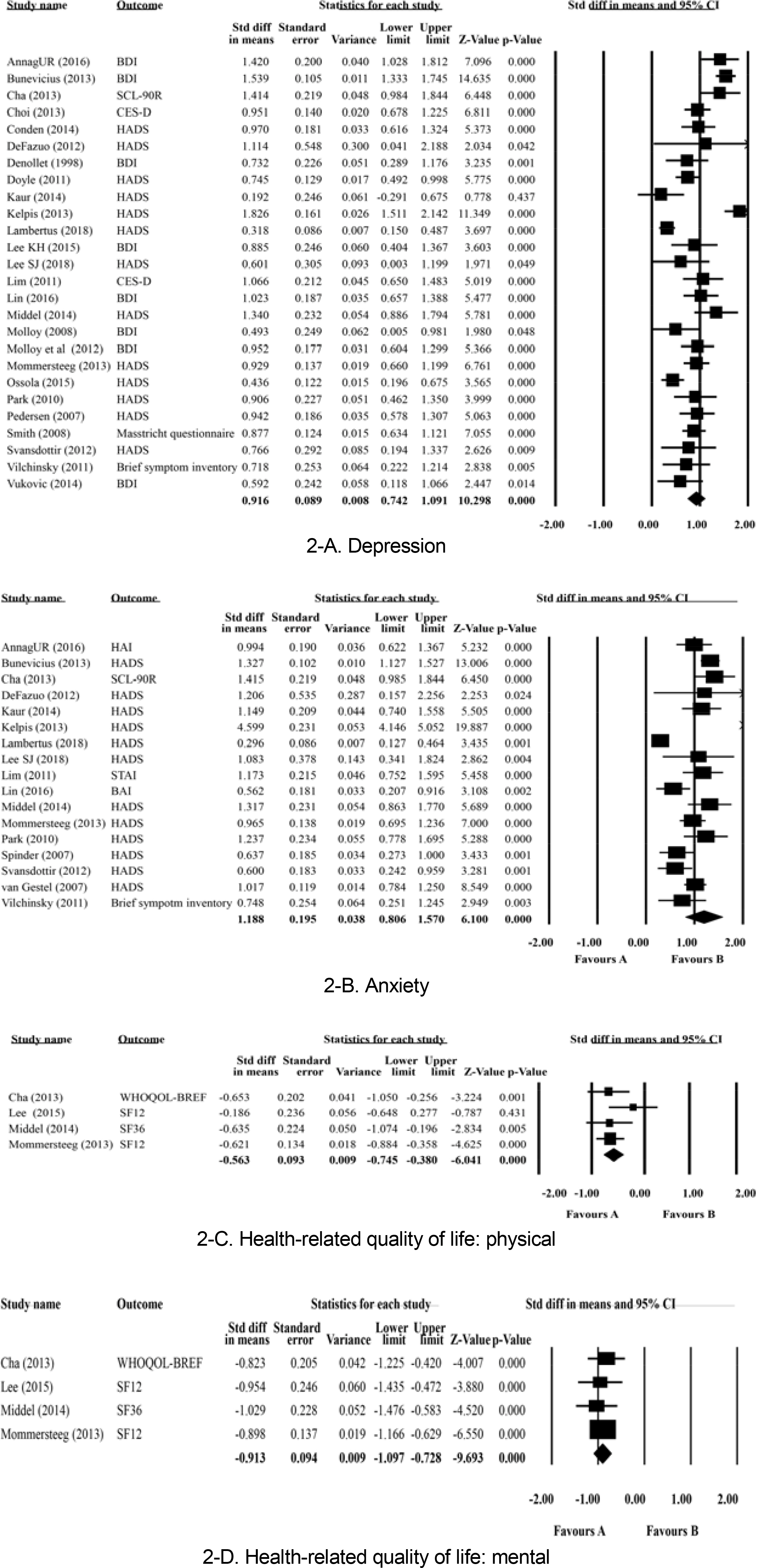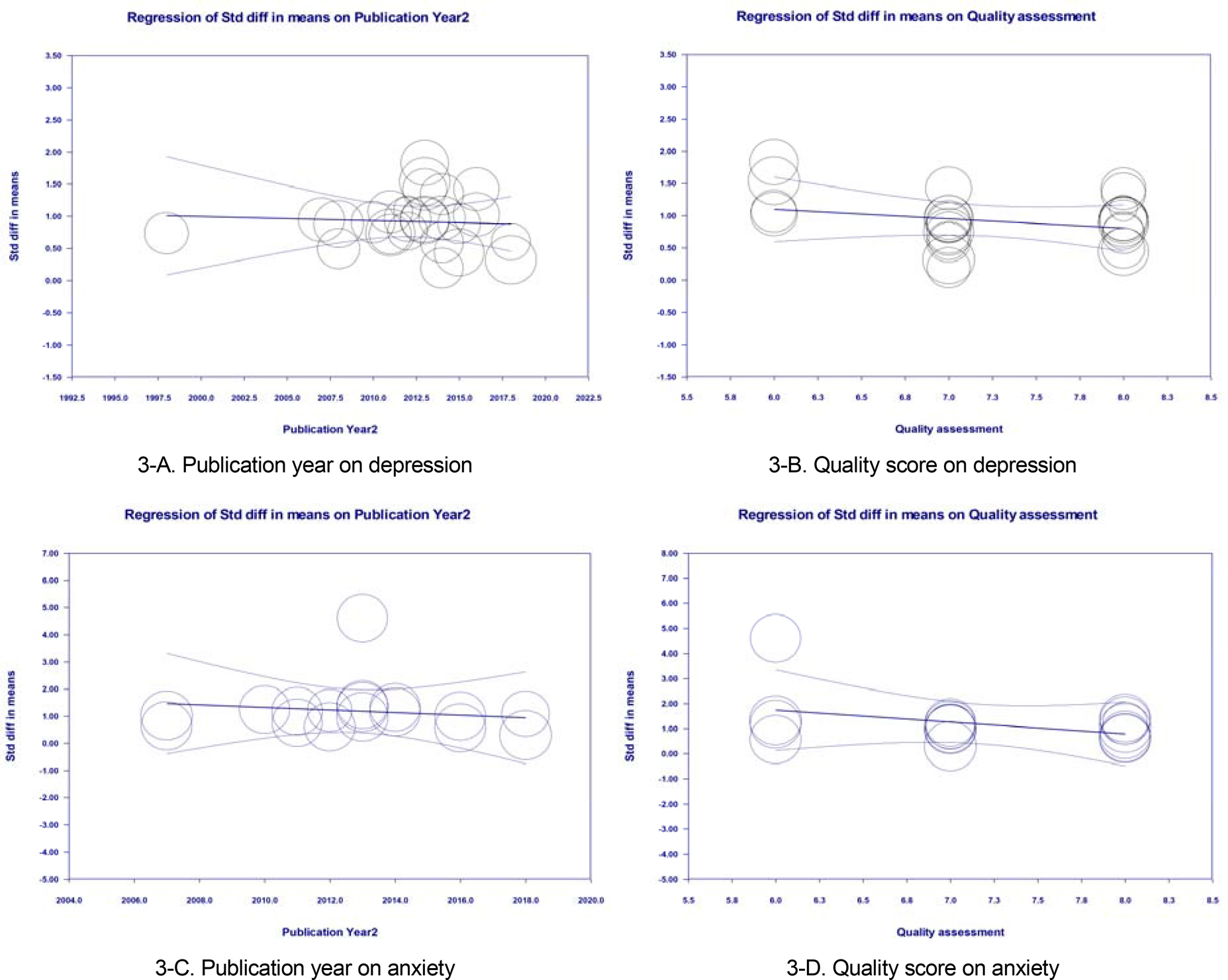Korean J Adult Nurs.
2019 Jun;31(3):219-234. 10.7475/kjan.2019.31.3.219.
Impact of Type D Personality on Depression, Anxiety, and Health-related Quality of Life among Coronary Artery Disease Patients: A Systematic Review and Meta-analysis
- Affiliations
-
- 1Associate Professor, College of Nursing · Research Institute of Nursing Science, Ajou University, Suwon, Korea.
- 2Professor, College of Nursing · Research Institute of Nursing Science, Ajou University, Suwon, Korea. jhee@ajou.ac.kr
- KMID: 2450087
- DOI: http://doi.org/10.7475/kjan.2019.31.3.219
Abstract
- PURPOSE
The purpose of this study was to investigate the impact of Type D personality among patients with Coronary Artery Disease (CAD).
METHODS
Seven databases were searched to conduct a systematic review and meta-analysis. Two reviewers independently searched, selected, extracted, and assessed the studies. The quality of studies was evaluated using the JBI Critical Appraisal Checklist. To estimate the effect size, meta-analysis of the studies was performed using the Comprehensive Meta-Analysis 3.0 program.
RESULTS
Of 1,128 publications identified, 31 studies that met the inclusion criteria were used to estimate the effect size of Type D personality. Effect size (Standardized Mean Difference [SMD]) was used in the analyses. Patients with CAD who had Type D personality had higher levels of depression (SMD=0.92; 95% Confidecne Interval (CI)=0.74~1.10) and anxiety (SMD=1.19; 95% CI=0.81~1.57), but lower levels of physical and mental health-related quality of life (SMD=−0.56; 95% CI=−0.75~−0.38; SMD=−0.91; 95% CI=−1.10~−0.73). Publication bias was not detected.
CONCLUSION
Type D personality was associated with increased depression and anxiety and impaired health-related quality of life in patients with CAD. Personality and psychosocial risk screening in patients with CAD should be conducted in the clinical setting.
MeSH Terms
Figure
Reference
-
1. Denollet J. DS14: standard assessment of negative affectivity, social inhibition, and Type D personality. Psychosomatic Medicine. 2005; 67(1):89–97. https://doi.org/10.1097/01.psy.0000149256.81953.49.
Article2. Grande G, Romppel M, Barth J. Association between Type D personality and prognosis in patients with cardiovascular diseases: a systematic review and metaanalysis. Annals of Behavioral Medicine. 2012; 43(3):299–310. https://doi.org/10.1007/s12160-011-9339-0.
Article3. Kupper N, Denollet J. Type D personality as a risk factor in coronary heart disease: a review of current evidence. Current Cardiology Reports. 2018; 20(11):104. https://doi.org/10.1007/s11886-018-1048-x.
Article4. Piepoli MF, Hoes AW, Agewall S, Albus C, Brotons C, Cata-pano AL, et al. 2016 European guidelines on cardiovascular disease prevention in clinical practice: the sixth joint task force of the European society of cardiology and other societies on cardiovascular disease prevention in clinical practice (consti-tuted by representatives of 10 societies and by invited experts) developed with the special contribution of the European association for cardiovascular prevention & rehabilitation (EACPR). Atherosclerosis. 2016; 252:207–74. https://doi.org/10.1016/j.atherosclerosis.2016.05.037.5. Doyle F, McGee H, Delaney M, Motterlini N, Conroy R. Depressive vulnerabilities predict depression status and trajectories of depression over 1 year in persons with acute coronary syndrome. General Hospital Psychiatry. 2011; 33(3):224–31. https://doi.org/10.1016/j.genhosppsych.2011.03.008.
Article6. Lambertus F, Herrmann-Lingen C, Fritzsche K, Hamacher S, Hellmich M, Junger J, et al. Prevalence of mental disorders among depressed coronary patients with and without Type D personality. Results of the multicenter SPIRR-CAD trial. General Hospital Psychiatry. 2018; 50:69–75. https://doi.org/10.1016/j.genhosppsych.2017.10.001.
Article7. Starrenburg AH, Kraaier K, Pedersen SS, van Hout M, Scholten M, van der Palen J. Association of psychiatric history and Type D personality with symptoms of anxiety, depression, and health status prior to ICD implantation. International Journal of Behavioral Medicine. 2013; 20(3):425–33. https://doi.org/10.1007/s12529-012-9244-3.
Article8. Park J-H, Bae SH. A systematic review of psychological distress as a risk factor for recurrent cardiac events in patients with coronary artery disease. Journal of Korean Academy of Nursing. 2011; 41(5):704–14. https://doi.org/10.4040/jkan.2011.41.5.704.
Article9. Song EK, Son YJ. The analysis of Type D personality research as a psychosocial risk factor in cardiovascular disease for elders with a chronic disease. Journal of Korean Academy of Nursing. 2008; 38(1):19–28. https://doi.org/10.4040/jkan.2008.38.1.19.
Article10. Barth J, Schumacher M, Herrmann-Lingen C. Depression as a risk factor for mortality in patients with coronary heart disease: a metaanalysis. Psychosomatic Medicine. 2004; 66(6):802–13. https://doi.org/10.1097/01.psy.0000146332.53619.b2.
Article11. Roest AM, Martens EJ, Denollet J, de Jonge P. Prognostic association of anxiety post myocardial infarction with mortality and new cardiac events: a metaanalysis. Psychosomatic Medicine. 2010; 72(6):563–9. https://doi.org/10.1097/PSY.0b013e3181dbff97.
Article12. Jo EH, Han SH, Lee MH, Kim SR. Influencing effects of Type D personality on symptom experiences and quality of life in patients with percutaneous coronary intervention. Korean Journal of Adult Nursing. 2016; 28(5):536–45. https://doi.org/10.7475/kjan.2016.28.5.536.
Article13. Schiffer AA, Denollet J, Widdershoven JW, Hendriks EH, Smith ORF. Failure to consult for symptoms of heart failure in patients with a type-D personality. Heart. 2007; 93(7):814–8. https://doi.org/10.1136/hrt.2006.102822.
Article14. Noh I-K, Kim MS. Moderating effect of lifestyle and Type D personality on the relationship between metabolic syndrome and severity of coronary artery disease. Korean Journal of Adult Nursing. 2018; 30(3):290–300. https://doi.org/10.7475/kjan.2018.30.3.290.
Article15. Sajobi TT, Wang M, Awosoga O, Santana M, Southern D, Liang Z, et al. Trajectories of health-related quality of life in coronary artery disease. Circulation: Cardiovascular Quality and Outcomes. 2018; 11(3):e003661. https://doi.org/10.1161/circoutcomes.117.003661.
Article16. Versteeg H, Spek V, Pedersen SS, Denollet J. Type D personality and health status in cardiovascular disease populations: a metaanalysis of prospective studies. European Journal of Preventive Cardiology. 2012; 19(6):1373–80. https://doi.org/10.1177/1741826711425338.
Article17. O'Dell KR, Masters KS, Spielmans GI, Maisto SA. Does type-D personality predict outcomes among patients with cardiovascular disease? A meta-analytic review. Journal of Psychosomatic Research. 2011; 71(4):199–206. https://doi.org/10.1016/j.jpsychores.2011.01.009.18. Mols F, Denollet J. Type D personality among noncardiovascular patient populations: a systematic review. General Hospital Psychiatry. 2010; 32(1):66–72. https://doi.org/10.1016/j.genhosppsych.2009.09.010.
Article19. Mols F, Denollet J. Type D personality in the general population: a systematic review of health status, mechanisms of disease, and work-related problems. Health and Quality of Life Outcomes. 2010; 8:9. https://doi.org/10.1186/1477-7525-8-9.
Article20. Son HM. Verification for the validity and reliability of the Type D Scale-14. Journal of Korean Academy of Fundamentals of Nursing. 2008; 15(3):312–20.21. Higgins JP, Green S. Cochrane handbook for systematic reviews of interventions. England: John Wiley & Sons, Ltd;2008. p. 81–388.22. Moher D, Liberati A, Tetzlaff J, Altman DG. Preferred reporting items for systematic reviews and meta-analyses: the PRISMA statement. BMJ. 2009; 339:b2535. https://doi.org/10.1136/bmj.b2535.
Article23. The Joanna Briggs Institute. The Joanna Briggs Institute critical appraisal tools for use in JBI systematic reviews [Internet]. Adelaide: Joanna Briggs Institute;2017. [cited 2019 February 11]. Available from:. http://joannabriggs.org/research/critical-appraisal-tools.html.24. Sahoo S, Padhy SK, Padhee B, Singla N, Sarkar S. Role of personality in cardiovascular diseases: an issue that needs to be focused too! Indian Heart Journal. 2018; 70(suppl 3):S471–7. https://doi.org/10.1016/j.ihj.2018.11.003.25. Hunt-Shanks T, Blanchard C, Reid R, Fortier M, Cappelli M. A psychometric evaluation of the Hospital Anxiety and Depression Scale in cardiac patients: addressing factor structure and gender invariance. British Journal of Health Psychology. 2010; 15(1):97–114. https://doi.org/10.1348/135910709x432745.
Article26. Lee SY, Choi SC, NA YH. A study on quality of life related to health. Journal of Neurogastroenterology and Motility. 2001; 7(1):6–17.27. Thompson DR, Ski CF, Garside J, Astin F. A review of health- related quality of life patient-reported outcome measures in cardiovascular nursing. European Journal of Cardiovascular Nursing. 2016; 15(2):114–25. https://doi.org/10.1177/1474515116637980.28. Denollet J, Conraads VM. Type D personality and vulner-ability to adverse outcomes in heart disease. Cleveland Clinic Journal of Medicine. 2011; 78(suppl 1):S13–9. https://doi.org/10.3949/ccjm.78.s1.02.
ArticleAppendix 1. Studies Included in Systematic Review
A1. Annagür BB, Demir K, Avci A, Uygur Ö F. Impact of a Type D personality on clinical and psychometric properties in a sample of Turkish patients with a first myocardial infarction. Journal of Psychiatric Practice. 2017; 23(1):3–10. https://doi.org/10.1097/PRA.0000000000000201.A2. Bunevicius A, Staniute M, Brozaitiene J, Stropute D, Bunevicius R, Denollet J. Type D (distressed) personality and its assessment with the DS14 in Lithuanian patients with coronary artery disease. Journal of Health Psychology. 2013; 18(9):1242–51. https://doi.org/10.1177/1359105312459098.
ArticleA3. Cha KS, Im SM, Cho O-H. Mental health and quality of life by Type-D personality of the patients with coronary artery disease. The Journal of the Korean Content Association. 2013; 13(5):286–94. https://doi.org/10.5392/JKCA.2013.13.05.286.
ArticleA4. Choi YO. A comparison of factors influencing health behavior compliance by Type D personality in the patients with coronary artery disease [master's thesis]. Gwangju: Chonnam National University;2013.A5. Condén E, Rosenblad A, Ekselius L, Åslund C. Prevalence of Type D personality and factorial and temporal stability of the DS14 after myocardial infarction in a Swedish population. Scandinavian Journal of Psychology. 2014; 55(6):601–60. https://doi.org/10.1111/sjop.12162.
ArticleA6. De Fazio P, Caroleo M, Rizza P, Cerminara G, De Serio D, Indolfi C, et al. Specific personality traits and coping styles predict affective symptoms in early post acute coronary syndrome inpatients. The International Journal of Psychiatry in Medicine. 2012; 44(2):119–32. https://doi.org/10.2190/PM.44.2.c. A7. Denollet J. Personality and coronary heart disease: The Type- D Scale-16 (DS16). Annals of Behavioral Medicine. 1998; 20(3):209–15. https://doi.org/10.1007/BF02884962.
ArticleA8. Doyle F, McGee HM, Conroy RM, Delaney M. What predicts depression in cardiac patients: sociodemographic factors, disease severity or theoretical vulnerabilities? Psychology & Health. 2011; 26(5):619–34. https://doi.org/10.1080/08870441003624398.
ArticleA9. Kaur S, Zainal NZ, Low WY, Ramasamy R, Sidhu JS. Factor structure of hospital anxiety and depression scale in Malay-sian patients with coronary artery disease. Asia Pacific Journal of Public Health. 2015; 27(4):450–60. https://doi.org/10.1177/1010539514533719.
ArticleA10. Kelpis TG, Anastasiadis K, Nimatoudis I, Kelpi MG, Hadjimil-tiades S, Papakonstantinou C. Prevalence of "distressed" personality in patients with coronary artery disease and its correlation with morbidity after coronary surgery. Hellenic Journal of Cardiology. 2013; 54(5):362–7.A11. Lambertus F, Herrmann-Lingen C, Fritzsche K, Hamacher S, Hellmich M, Jünger J, et al. Prevalence of mental disorders among depressed coronary patients with and without Type D personality. Results of the multicenter SPIRR-CAD trial. General Hospital Psychiatry. 2018; 50:69–75. https://doi.org/10.1016/j.genhosppsych.2017.10.001.
ArticleA12. Lee KH. Depression and health status in patient with Type D personality coronary artery disease [master's thesis]. Seoul: Korea University;2015.A13. Lee SJ, Koh S, Kim BO, Kim B, Kim C. Effect of Type D personality on short-term cardiac rehabilitation in patients with coronary artery disease. Annals of Rehabilitation Medicine. 2018; 42(5):748–57. https://doi.org/10.5535/arm.2018.42.5.748.
ArticleA14. Lim HE, Lee M-S, Ko Y-H, Park Y-M, Joe S-H, Kim Y-K, et al. Assessment of the Type D personality construct in the Korean population: a validation study of the Korean DS14. Journal of Korean Medical Science. 2011; 26(1):116–23. https://doi.org/10.3346/jkms.2011.26.1.116.
ArticleA15. Lin I-M, Wang S-Y, Chu I-H, Lu Y-H, Lee C-S, Lin T-H, et al. The association of Type D personality with heart rate varia-bility and lipid profiles among patients with coronary artery disease. International Journal of Behavioral Medicine. 2017; 24(1):101–9. https://doi.org/10.1007/s12529-016-9571-x. A16. Middel B, El Baz N, Pedersen SS, van Dijk JP, Wynia K, Reijneveld SA. Decline in health-related quality of life 6 months after coronary artery bypass graft surgery: the influence of anxiety, depression, and personality traits. Journal of Cardiovascular Nursing. 2014; 29(6):544–54. https://doi.org/10.1097/JCN.0b013e3182a102ae. A17. Molloy GJ, Perkins-Porras L, Strike PC, Steptoe A. Type-D personality and cortisol in survivors of acute coronary syndrome. Psychosomatic Medicine. 2008; 70(8):863–8. https://doi.org/10.1097/psy.0b013e3181842e0c. A18. Molloy GJ, Randall G, Wikman A, Perkins-Porras L, Messerli- Bürgy N, Steptoe A. Type D personality, self-efficacy, and medication adherence following an acute coronary syndrome. Psychosomatic Medicine. 2012; 74(1):100–6. https://doi.org/10.1097/PSY.0b013e31823a5b2f. A19. Mommersteeg PMC, Pot I, Aarnoudse W, Denollet J, Widdershoven JW. Type D personality and patient-perceived health in nonsignificant coronary artery disease: the Tweeste-den Mild Stenosis (TWIST) study. Quality of Life Research. 2013; 22(8):2041–50. https://doi.org/10.1007/s11136-012-0340-2.
ArticleA20. Ossola P, De Panfilis C, Tonna M, Ardissino D, Marchesi C. DS14 is more likely to measure depression rather than a personality disposition in patients with acute coronary syndrome. Scandinavian Journal of Psychology. 2015; 56(6):685–92. https://doi.org/10.1111/sjop.12244.
ArticleA21. Park J-H, Tahk S-J, Bae S-H. Impact of Type D personality on health status and health behaviors in patients with coronary artery disease. Korean Journal of Health Promotion. 2010; 10(3):123–30.A22. Pedersen SS, Denollet J, van Gestel YRBM, Serruys PW, van Domburg RT. Clustering of psychosocial risk factors enhan-ces the risk of depressive symptoms 12-months post percutaneous coronary intervention. European Journal of Preventive Cardiology. 2008; 15(2):203–9. https://doi.org/10.1097/HJR.0b013e3282f19d2f. A23. Pelle AJ, Erdman RAM, van Domburg RT, Spiering M, Kazemier M, Pedersen SS. Type D patients report poorer health status prior to and after cardiac rehabilitation compared to non-Type D patients. Annals of Behavioral Medicine. 2008; 36(2):167–75. https://doi.org/10.1007/s12160-008-9057-4.
ArticleA24. Smith ORF, Pedersen SS, van Domburg RT, Denollet J. Symptoms of fatigue and depression in ischemic heart disease are driven by personality characteristics rather than disease stage: a comparison of CAD and CHF patients. European Journal of Preventive Cardiology. 2008; 15(5):583–8. https://doi.org/10.1097/HJR.0b013e3283083e17.
ArticleA25. Son H-M. Quality of life and illness intrusiveness by Type-D personality in the patients with coronary artery disease. Journal of Korean Academy of Nursing. 2009; 39(3):349–56. https://doi.org/10.4040/jkan.2009.39.3.349.
ArticleA26. Spindler H, Pedersen SS, Serruys PW, Erdman RAM, van Domburg RT. Type-D personality predicts chronic anxiety following percutaneous coronary intervention in the drug- eluting stent era. Journal of Affective Disorders. 2007; 99(1-3):173–9. https://doi.org/10.1016/j.jad.2006.09.009.A27. Svansdottir E, van den Broek KC, Karlsson HD, Gudnason T, Denollet J. Type D personality is associated with impaired psychological status and unhealthy lifestyle in Icelandic cardiac patients: a cross-sectional study. BMC Public Health. 2012; 12:42. https://doi.org/10.1186/1471-2458-12-42.
ArticleA28. van Gestel YRBM, Pedersen SS, van de Sande M, de Jaegere PPT, Serruys PW, Erdman RAM, et al. Type-D personality and depressive symptoms predict anxiety 12 months post-percutaneous coronary intervention. Journal of Affective Disorders. 2007; 103(1-3):197–203. https://doi.org/10.1016/j.jad.2007.01.030.A29. Vilchinsky N, Yaakov M, Sigawi L, Leibowitz M, Reges O, Levit O, et al. Preliminary evidence for the construct and con-current validity of the DS14 in Hebrew. International Journal of Behavioral Medicine. 2012; 19(2):234–40. https://doi.org/10.1007/s12529-011-9147-8.
ArticleA30. Vukovic O, Tosevski DL, Jasovic-Gasic M, Damjanovic A, Zebic M, Britvic D, et al. Type D personality in patients with coronary artery disease. Psychiatria Danubina. 2014; 26(1):46–51.A31. Williams L, O'Connor RC, Grubb NR, O'Carroll RE. Type D personality and three-month psychosocial outcomes among patients post-myocardial infarction. Journal of Psychosomatic Research. 2012; 72(6):422–6. https://doi.org/10.1016/j.jpsychores.2012.02.007.
Article
- Full Text Links
- Actions
-
Cited
- CITED
-
- Close
- Share
- Similar articles
-
- Quality of Life and Illness Intrusiveness by Type-D Personality in the Patients with Coronary Artery Disease
- The effectiveness of nurse-led interventions on quality of life, medication adherence, anxiety, and depression in kidney transplant recipients: A systematic review and meta-analysis
- Type A Personality and Coronary Artery Disease
- Mediating Effect of Physical Activity in the Relationship between Depressive Symptoms and Health-related Quality of Life in Patients with Coronary Artery Disease: The 2016 Nationwide Community Health Survey in Korea
- Factors Relating to Quality of Life in Korean Breast Cancer Patients: Systematic Review and Meta-analysis




